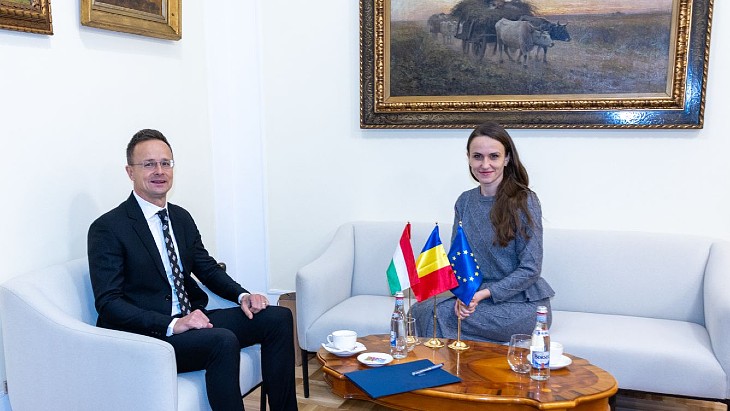Following talks with his Romanian counterpart, he said that both countries were members of the European Nuclear Alliance and oppose "ideological" attacks on its use.
In a post on Facebook he said that they had agreed to "cooperate both professionally and politically to extend the service life of our existing nuclear power plants".
The talks covered general Hungarian-Romanian relations, including broader energy cooperation and wider bilateral links such as the proposed construction of four new cross-border roads.
Romania's Minister of Foreign Affairs, Oana Țoiu, said the two had "discussed the intensification of bilateral trade exchanges and the prospects for strengthening cooperation in sectoral areas, such as infrastructure, transport, energy, etc".
And Romania's Energy Minister Bogdan Ivan, who hosted the 7th International Energy Conference in Bucharest on Tuesday, said: "Energy does not respect borders, and Romania and Hungary are jointly implementing solutions for the stability of the region. Today I had a very practical discussion with Péter Szijjártó … about the solid partnership between our countries. It is a pragmatic collaboration, built on common interests, which strengthens the energy security of the entire region."
Life extension projects
Both countries have embarked on projects to extend the lifetimes of their respective nuclear power plants.
Hungary’s existing four units at Paks are VVER-440 reactors that started up between 1982 and 1987 and they produce about half of the country's electricity. Their design lifetime was for 30 years but that was extended in 2005 by 20 years, to between 2032 and 2037. In 2023 the country announced plans to extend their operation to 70 years.
Cernavoda is the only nuclear power plant in Romania and consists of two 650 MWe Candu reactors. Unit 1 went into commercial operation in 1996 and unit 2 in 2007. Most of the work on units 3 and 4 - like units 1 and 2, Candu-6 reactors - was done in the 1980s prior to the fall of the government of Nicolae Ceaușescu in 1989. Work is now on-going to construct units 3 and 4, with scheduled commercial operation in 2030 and 2031.
Candu units are pressurised heavy water reactors designed to operate for 30 years, with a further 30 years available subject to refurbishment. Such a refurbishment project for Cernavoda unit 1 began in 2017 and is currently in the second of three phases. This phase, due to last from February 2022 to 2026, covers providing the financial resources, negotiating and granting engineering, procurement and construction contracts, assessing, preparing and scheduling the activities to be carried out and obtaining all the authorisations and approvals necessary to start the project. The third phase, scheduled for 2027 to 2029, starts with the shutdown of unit 1 and includes all the work required on it and its recommissioning.





_87299.jpg)
_52351.jpg)








